On the constant lookout for environmental crime and damaging wildfire, Rewilding Portugal’s surveillance team travel thousands of kilometres every year to protect wolves and other wildlife south of the Douro River.
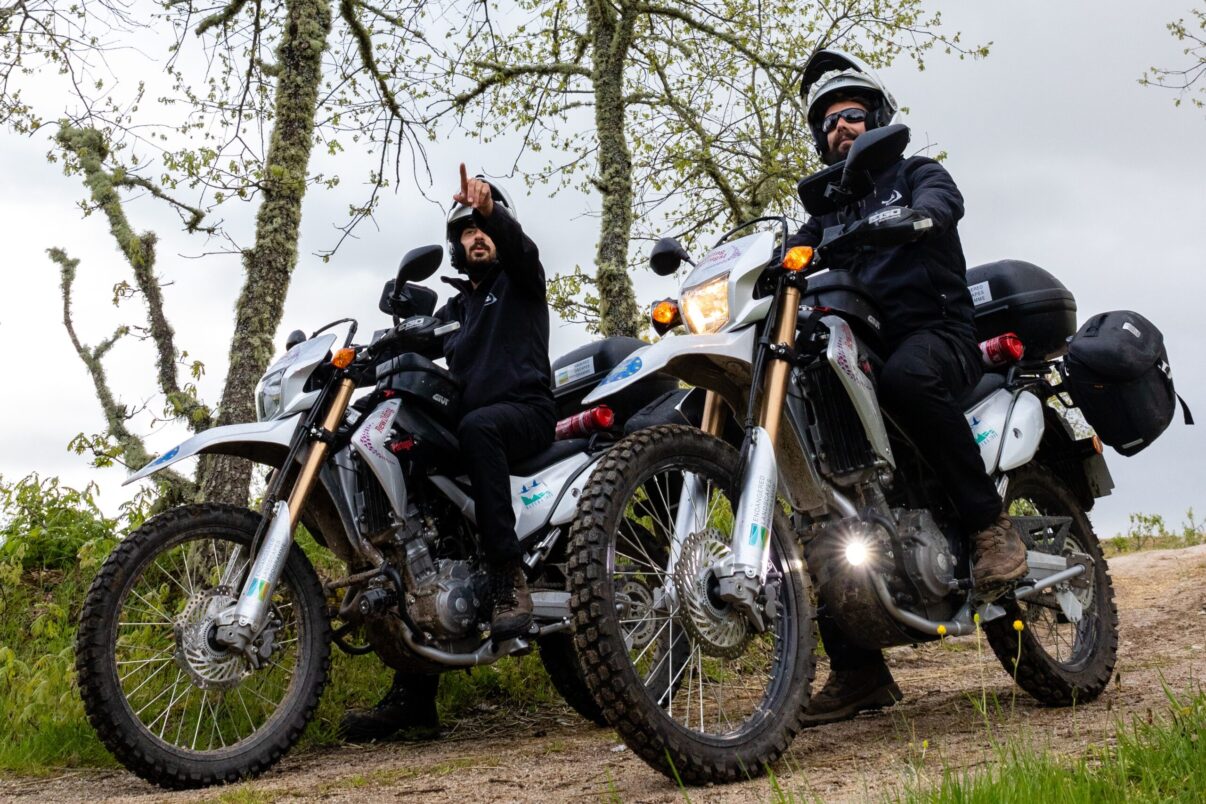
Boots on the ground
It’s seven thirty in the morning and Miguel Pontes and Gonçalo Matos – Rewilding Portugal’s surveillance team – are ready to begin another day in the field. A typical January morning in the northern Portuguese city of Guarda sees the weather cold and overcast, a chill wind ruffling the raincoats of both men. The pair climb onto their motorbikes and embark on a two-hour drive through rural northern Portugal, travelling first along the highway, then down winding local roads and dirt paths.
Miguel and Gonçalo are the boots on the ground of Rewilding Portugal, working every day to find and report environmental crimes such as snares and poisoned baits, as well as damaging rural fires. Their efforts are an essential part of protecting nature in the region south of the Douro River, in the districts of Aveiro, Viseu and Guarda. Catastrophic fire and poaching are two major threats to many wildlife species here, including the endangered Iberian wolf.
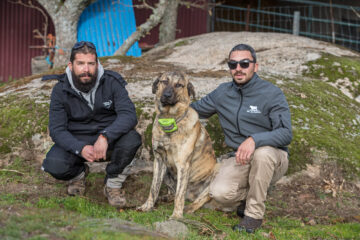
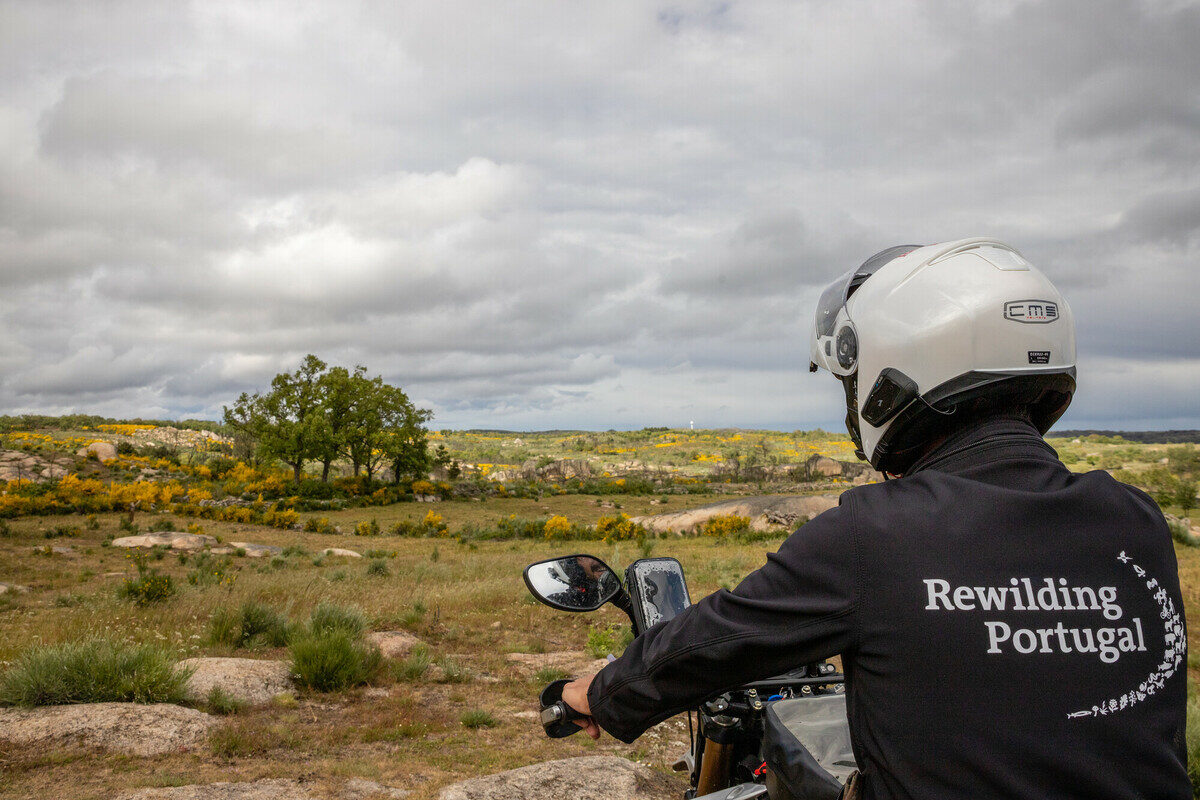
An existential threat
By 10.30 the pair arrive in the Montemuro mountains where they will be patrolling today. Their task is to travel with their motorbikes along dirt paths, trying to detect snares in the thick undergrowth. Snares are devices used for catching wild animals, usually with a rope or wire that becomes progressively tighter after capture. Despite the fact that they are illegal in Portugal, they are typically used by locals to catch wild boar – an animal which can cause significant damage to local crops and whose meat is highly prized. But snares are indiscriminate and trap a wide range of animals, including the Iberian wolf.
Between 1997 and 2019, six wolf deaths were attributed to snares south of the Douro River. But the real number is likely to be higher than this, as more often than not animals caught in snares are quietly disposed of. Such numbers are significant for a population with fewer than 50 individuals left.
To address the threats this population faces, and to ensure its long-term viability, the European Commission approved and funded the LIFE WolFlux initiative in 2019. The Rewilding Portugal surveillance team is one of the ways in which LIFE WolFlux is trying to protect this iconic and ecologically important species.
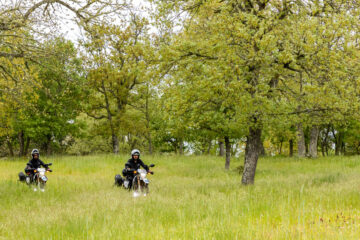
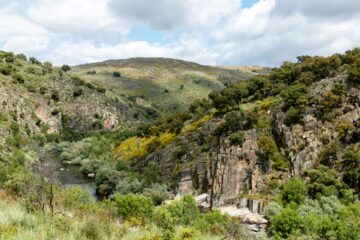
Hunting snares
Having searched for a few hours, the surveillance team takes a break for lunch, scanning the landscape below for likely snare locations. The Arada and Montemuro mountains are currently home to up to half of the total wolf population south of the Douro, which is why the area was designated part of the Natura 2000 network.
Walking at the edge of a cultivated field after lunch, the surveillance team strikes gold – several snares placed inconspicuously over an area of several square metres, ready to trap whatever passes through the area.
The team records the coordinates and takes photos, documenting the evidence. It is important this information is sent to the authorities. Firstly, though, they get in touch with Rewilding Portugal’s Head of Conservation, Sara Aliácar. She will report the location of the snares to the GNR-SEPNA, the Portuguese police branch responsible for prosecuting environmental crimes.
“It was really important to forge a good working relationship with the GNR-SEPNA,” explains Aliácar. “This helped us to define how the surveillance team should act when they come across snares and other environmental crimes.”
The surveillance team leaves the active snares in place. As difficult as this is, it increases the chances of catching whoever set them (GNR-SEPNA typically set up an operation to catch the poachers when they go to check their snares). This has been a good day – finding snares is a challenging task requiring a huge investment of time and effort. Even when snares are found, it is frequently impossible to identify the person who set them, and the crime goes unpunished – which is why this type of environmental crime is still so common in northern Portugal.
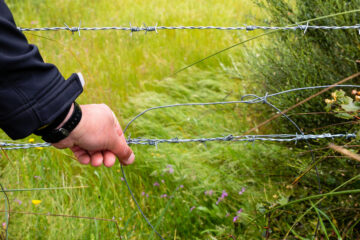
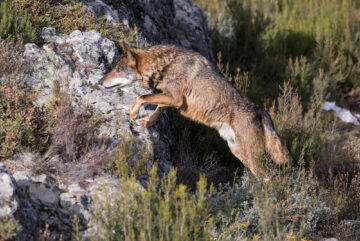
Fighting fire
During the warmest part of the year, from March to October, the surveillance team has an additional task on its hands – looking out for damaging wildfire. In addition to snares, this is one of the main threats to wildlife in the region.
Today, the team are in Encostas da Juvénia, one of Rewilding Portugal’s nature reserves. Miguel and Gonçalo scan the landscape with their binoculars, looking for telltale signs of smoke. They know at least one-quarter of the 9,000 square kilometres they regularly patrol has burned between 2008 and 2018.
It is almost midday, and the next few hours will be the most dangerous ones, as temperatures soar and the sun blazes down on the almost bare landscape. This particular area suffers from wildfire outbreaks less than every three years – a punishing frequency that prevents forests from returning.
The surveillance team has chosen this vantage point as it commands a good 360-degree view of the landscape. In addition to binoculars, they also have a drone which can be used to scan a larger area of ground. The goal is to detect potential catastrophic fire early. A few minutes can make all the difference when it comes to putting out a fire, especially on a hot windy day.
Negative impacts
Catastrophic fire affects biodiversity in many ways. For wolves, fires reduce the abundance of wild prey, which means having to move from a preferred area to a less preferable one. Fire can also destroy breeding sites for wolves, and – in a worst-case scenario – cause mortality. All this creates an unstable environment for wolf packs, making them more vulnerable and negatively impacting their chances of breeding successfully.
When wildfires are very frequent and intense, they also degrade the soil, destroy the seed bank, and reduce the local biodiversity of plant species. The plants that are best adapted to frequent fire, such as broom, become dominant, and trees are unable to grow back. The result is poor soils and monotonous landscapes, with large areas of brush dominated by only a few species. These simplified ecosystems have fewer species and are of less benefit to people, since soils are less productive and the vegetation captures less atmospheric carbon.
Enhanced wildfire monitoring was one of the reasons for the creation of the surveillance team. From March to October 2021, Miguel and Gonçalo were part of the Integrated Rural Fire Management System (SGIFR), coordinating closely with national authorities to increase the overall fire surveillance effort in the region.
After many hours scanning the horizon, the surveillance team pack up and head for home, tired but happy that Encostas da Juvénia remains safe and fire-free for another day.
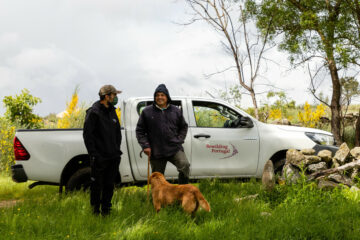
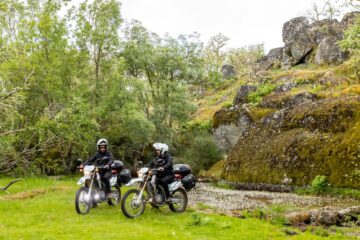
Delivering results
In 2021, Miguel and Gonçalo travelled nearly 30,000 kilometres and detected twenty-nine snares. They safeguarded high-priority areas for the Iberian wolf and other important areas for biodiversity and played a key role in raising awareness in local communities.
Having travelled so far, the pair say the work has won them over, but each for different reasons.
“I like having the opportunity to play an active role in nature conservation,” says Miguel.
“I value having a connection with livestock farmers and having an impact on the ground by supporting them,” says Gonçalo. “We all work together.”
Going forwards the team will continue their work, which is becoming more targeted as they learn what works best and which approaches deliver the best results. Rewilding Portugal will continue to raise awareness of the need to prosecute environmental crimes and educate local communities about the damaging effects these crimes can have on people, the climate, and biodiversity.
